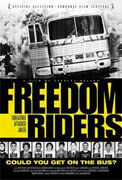Freedom Riders
Raymond Arsenault
book reviews:
· general fiction
· chick lit/romance
· sci-fi/fantasy
· graphic novels
· nonfiction
· audio books
· author interviews
· children's books @
curledupkids.com
· DVD reviews @
curledupdvd.com
newsletter
win books
buy online
links
home
for authors
& publishers
for reviewers

 |
Freedom Riders: 1961 and the Struggle for Racial Justice Raymond Arsenault Oxford University Press Paperback 320 pages March 2011 |
|
Perhaps the most remarkable thing about this haunting and inspiring story is that for so long, so little had been organized to tell it. Raymond Arsenault, a Professor of Southern History at the University of South Florida, saw the opportunity and felt the mandate to chronicle in scholarly and human detail the Freedom Rides of 1961 - not a “prelude to” but an integral part of the Civil Rights struggle in America.
The first 1961 Freedom Ride was meant to test a discrete segment of US law dating from 1946 that stated that interstate travel could not be segregated. This little piece of legal history overturned years of anti-black legislation carefully quilted in the Southern states to keep African-American people from experiencing equal freedoms with whites, and to subtly and blatantly reinforce the notorious Jim Crow laws. Determined to use this significant law as a toehold on broader civil rights, groups like CORE (Congress for Racial Equality), schooled in the non-violent resistance demonstrated and utilized by Mahatma Gandhi, decided to send racially mixed groups of “Freedom Riders” on public buses from Washington, DC, to New Orleans. As the groups traversed the fringe Southern states – Maryland, Virginia and North Carolina – they were greeted with cautious optimism by nervous blacks and cautious hostility by whites who believed that they had “their” blacks under control and did not need the example of people they considered “outside agitators” to stir things up. In South Carolina and Georgia, things got hotter. Hostilities became open. Vigilante groups, often supported and encouraged by the Ku Klux Klan, came out in force to beat, humiliate and torment the Riders. Then the Freedom Riders, drawing courage from one another, from black preachers and friendly whites along the way, headed into the state that all feared the most. Jim Farmer, who had been a leader of the group, was called back home to his father’s funeral and admitted that, to his shame, he felt relief that he would not have to ride the bus into Alabama. Alabama lay under a thick pall of segregation, with Governor John Patterson wielding power largely on his promises to keep groups like the NAACP and CORE out of his state. Bobby Kennedy, depicted by Arsenault as trying to make civil rights policy on the fly and keep his brother alerted to the dangerous situation brewing in the Deep South, urged Jack to call Gov. Patterson, who refused the call, famously telling the President’s office that he had “gone fishing.” After that, all hell broke loose in Anniston, where the Greyhound bus full of black and white Freedom Riders of all ages was set on fire. The many injured riders were given minimal to no treatment at the local hospital. The family of a little white girl who gave the Riders water to drink was later ostracized by the community. After the Alabama encounters, the first Freedom Riders regrouped, and many more rides were to follow during that fateful year. The Freedom Rider saga will be presented, with many personal memories from the Riders and the citizens of the Southern towns they rode through (including Governor Patterson) in a two-hour special on PBS in May, the fifty-year anniversary of those harrowing and hallowed events. The book serves a companion piece to the PBS special and provides the finer details and fascinating behind-the-scenes reportage. The tale of the Freedom Riders is somber yet triumphant, setting the tone for the victories that were to come, but serving too as a reminder that no battle is ever completely won. Originally published on Curled Up With A Good Book at www.curledup.com. © Barbara Bamberger Scott, 2011 |
|
|
|
 Click here to learn more about this month's sponsor! |
|
| fiction · sf/f · comic books · nonfiction · audio newsletter · free book contest · buy books online review index · links · · authors & publishers reviewers |
|
| site by ELBO Computing Resources, Inc. | |
 There was more than one ride, and more than one organization sponsoring the rides.
Great names like Martin Luther King, Jr. were part of the story, but just as important and arguably more poignant are the chapters that belong to private, unknown riders, young and old, who braved incalculable dangers, who were in some cases literally scarred for life, who risked their lives to uphold sacred principle.
There was more than one ride, and more than one organization sponsoring the rides.
Great names like Martin Luther King, Jr. were part of the story, but just as important and arguably more poignant are the chapters that belong to private, unknown riders, young and old, who braved incalculable dangers, who were in some cases literally scarred for life, who risked their lives to uphold sacred principle.